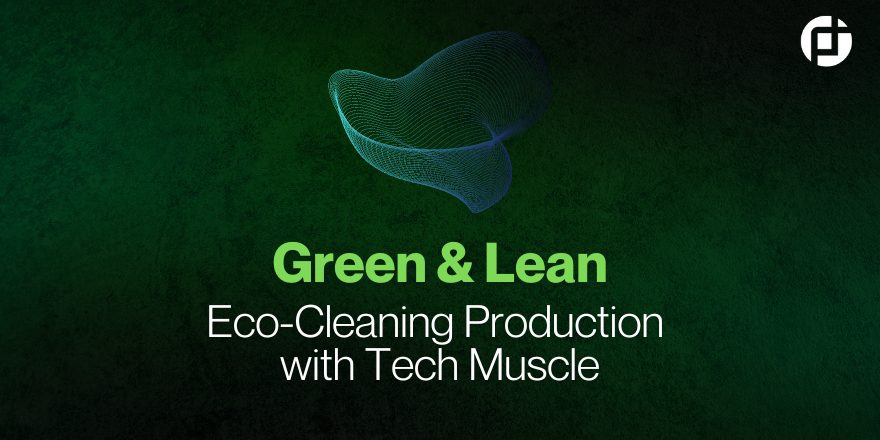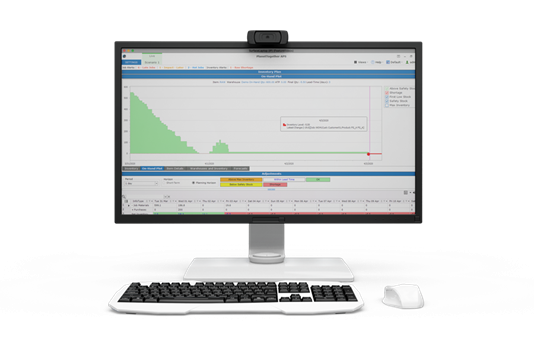
Sustainability is not just a buzzword; it's a critical driver for business success and a moral obligation. As a Production Scheduler in an industrial manufacturing facility, you play a pivotal role in ensuring that your company's operations align with environmentally responsible practices.
In this blog, we'll look into the world of production planning for eco-friendly cleaning product manufacturing. We'll also discuss the importance of integrating PlanetTogether with ERP, SCM, and MES systems like SAP, Oracle, Microsoft, Kinaxis, and Aveva to streamline your processes and drive sustainability.
The Rise of Eco-Friendly Cleaning Products
The Growing Demand for Sustainable Solutions
Consumers today are more conscious of their environmental footprint than ever before. They demand products that not only clean effectively but also leave a minimal impact on the planet. Eco-friendly cleaning products have gained immense popularity, creating a booming market for manufacturers who can meet this demand.
Challenges in Manufacturing Eco-Friendly Cleaning Products
Manufacturing eco-friendly cleaning products comes with its own set of challenges. These products often require unique formulations, specialized packaging, and stringent quality control measures. Additionally, the sustainability aspect involves managing resources, reducing waste, and adhering to strict environmental regulations.
The Role of Production Scheduler
Balancing Supply and Demand
As a Production Scheduler, your primary responsibility is to ensure a seamless flow of production while balancing supply and demand. For eco-friendly cleaning product manufacturing, this means optimizing the use of sustainable raw materials and minimizing waste.
Meeting Quality Standards
Eco-friendly products must meet stringent quality standards to maintain their eco-friendly credentials. Your role involves scheduling production runs that consistently produce high-quality, environmentally responsible products.
Compliance with Environmental Regulations
With increasing environmental regulations, you must stay abreast of the latest compliance requirements and ensure that your manufacturing processes align with these regulations.
The Importance of Integration
Streamlining Operations with ERP
Enterprise Resource Planning (ERP) systems like SAP, Oracle, and Microsoft are the backbone of manufacturing operations. Integrating PlanetTogether with these systems streamlines the flow of information, ensuring accurate data exchange between production scheduling and other critical functions such as inventory management, procurement, and finance.
Enhancing Visibility with SCM
Supply Chain Management (SCM) systems play a vital role in ensuring the availability of raw materials, packaging, and transportation. Integrating PlanetTogether with SCM systems helps in real-time visibility into the supply chain, allowing for better demand forecasting and inventory management.
MES for Real-Time Monitoring
Manufacturing Execution Systems (MES) provide real-time monitoring and control of production processes. Integration with PlanetTogether enables instant feedback on production status, helping you make informed scheduling decisions and promptly address any issues that may arise on the shop floor.
Leveraging PlanetTogether for Eco-Friendly Production
Demand Forecasting and Planning
PlanetTogether's advanced algorithms and forecasting capabilities allow you to predict demand accurately. By integrating with ERP and SCM systems, you can align production schedules with actual market demand, minimizing overproduction and reducing waste.
Sustainable Resource Allocation
Eco-friendly cleaning product manufacturing requires careful resource allocation. PlanetTogether can optimize the use of sustainable materials, ensuring that production is as eco-friendly as possible while minimizing costs.
Waste Reduction and Recycling
PlanetTogether can help in reducing waste by optimizing production schedules to minimize scrap and leftovers. Additionally, it can assist in planning for recycling and reusing materials, further enhancing your eco-friendly credentials.
The Road to Sustainable Manufacturing
Setting Sustainable Goals
To succeed in eco-friendly cleaning product manufacturing, it's essential to set clear sustainability goals. These goals should include reducing carbon emissions, minimizing waste, and optimizing the use of sustainable resources.
Continuous Improvement
Sustainability is an ongoing journey. Regularly monitor and evaluate your production processes, making improvements wherever possible. Integration between PlanetTogether and your ERP, SCM, and MES systems ensures that you can adapt quickly to changing circumstances and sustainability requirements.
Employee Training and Engagement
Your workforce is a crucial component of your sustainability efforts. Invest in training and engage your employees to make eco-friendly practices a part of your organizational culture.

Eco-friendly cleaning product manufacturing is not just a business opportunity; it's a responsibility towards our planet. As a Production Scheduler, you play a pivotal role in achieving sustainability goals while maintaining efficiency and quality.
By integrating PlanetTogether with ERP, SCM, and MES systems like SAP, Oracle, Microsoft, Kinaxis, and Aveva, you can streamline your operations, reduce waste, and optimize resource allocation. This integration will not only drive your company's success but also contribute to a cleaner, greener future for all.
Remember, the journey towards sustainable manufacturing is ongoing, and continuous improvement is key. Embrace the power of integration and sustainable practices, and you'll not only meet customer demands but also leave a positive impact on the environment for generations to come.






















LEAVE A COMMENT